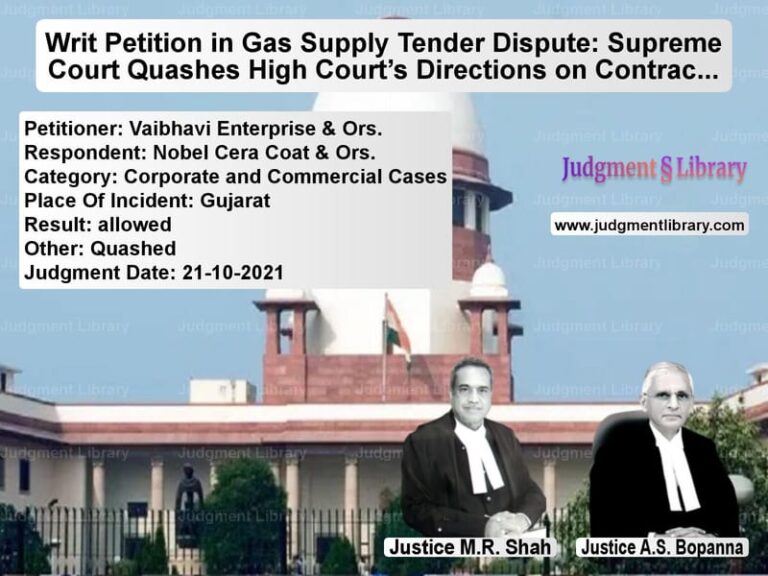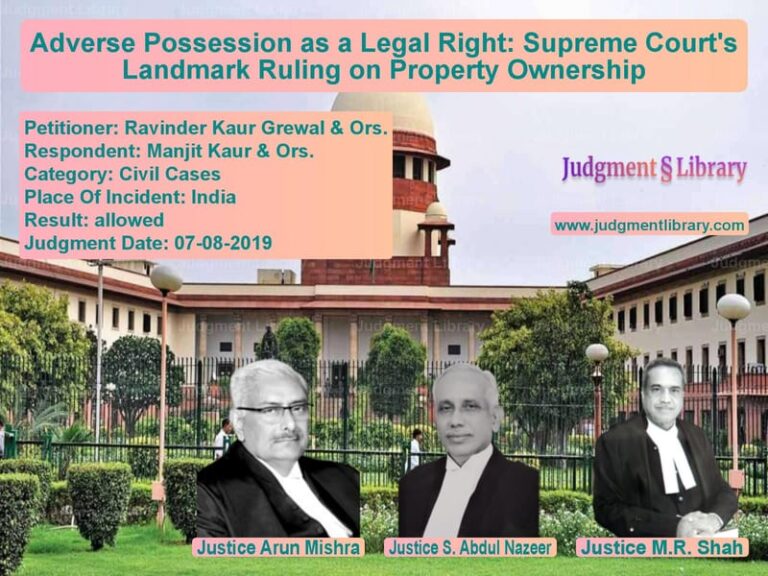Supreme Court Overturns Property Gift Judgment: Key Ruling on Muslim Law and Evidence
In a significant property dispute spanning over three decades, the Supreme Court of India delivered a landmark judgment that overturned concurrent findings of two lower courts. The case involved a complex web of claims about an oral gift under Muslim law, disputed parentage, and allegations of fraudulent property transactions. The legal battle centered around agricultural land measuring 24 acres and 28 guntas in Kusnoor village, Gulbarga district, Karnataka, with the parties presenting dramatically different versions of events that allegedly occurred decades earlier.
The Supreme Court’s ruling provides crucial clarity on several important legal principles, particularly regarding the evidence required to prove relationships and oral gifts under Muslim law, the limitations of appellate court powers, and the application of limitation periods in property disputes. The judgment demonstrates how courts must carefully scrutinize evidence, especially when claims are made long after the alleged events occurred.
The Property Dispute Background
The case originated from Khadijabee, who had obtained ownership of the suit property through a court decree in 1987. The central controversy began when Syeda Arifa Parveen (the plaintiff/respondent) claimed that Khadijabee had made an oral gift of 10 acres to her on December 5, 1988, followed by a memorandum of gift on January 5, 1989. The plaintiff asserted she was Khadijabee’s only daughter and legal heir.
However, after Khadijabee’s death in 1990, her husband Abdul Basit mutated the entire property in his name in 1991. Then in 1995, Abdul Basit sold the property through five registered sale deeds to Dharmrao Sharanappa Shabadi and others (the defendants/appellants). The defendants claimed they were bona fide purchasers who had verified the revenue records before purchase and had their names duly mutated in the records.
The plaintiff filed suit only in 2013, nearly 23 years after her mother’s death and 18 years after the sale deeds were executed. She sought declaration of her title to the entire property and cancellation of the sale deeds executed in favor of the defendants.
The Legal Battle Through Lower Courts
The Trial Court partially decreed the suit in the plaintiff’s favor, granting her 18 acres and 21 guntas while rejecting her claim based on the oral gift. The court accepted her status as Khadijabee’s daughter but found insufficient evidence of the oral gift’s validity.
The High Court went further, overturning the Trial Court’s finding on the oral gift and declaring the plaintiff as absolute owner of 10 acres through the gift plus a 3/4th share in the remaining property. This enhancement of relief occurred despite the plaintiff not filing any cross-appeal against the Trial Court’s judgment.
Supreme Court’s Critical Analysis
The Supreme Court undertook a comprehensive re-examination of the evidence, noting that while reappreciation of evidence is not normally undertaken under Article 136 of the Constitution, it becomes necessary when lower courts have made perverse findings or misread evidence. The Court identified several fundamental errors in the approach of both lower courts.
Regarding the plaintiff’s claim of being Khadijabee’s daughter, the Court meticulously analyzed the evidence requirements under Section 50 of the Indian Evidence Act. The Court emphasized that “the term ‘opinion’ is defined not as a casual statement or gossip but as a ‘judgment or belief’ or a ‘conviction.’ This belief is demonstrated and proved through the person’s conduct or behavior. The conduct must be of a tenor that can only be explained by the existence of that inner belief about the relationship.”
The Court found serious deficiencies in how the lower courts had evaluated the testimony of witnesses PW2 and PW3, who claimed special knowledge of the plaintiff’s relationship with Khadijabee. The Supreme Court noted that “the trial court failed to properly evaluate the oral evidence of witnesses PW2 and PW3 in accordance with the principles set forth in Dolgobinda Paricha (Supra) and Chandu Lal Agarwala (Supra). It failed to independently assess the credibility of the witnesses’ opinion and to form its own conclusion about the Plaintiff’s relationship with Khadijabee and Abdul Basit.”
The Court also criticized the Trial Court’s approach in comparing signatures under Section 73 of the Evidence Act, noting that “the Trial Court accepts the relationship based upon a document which is contested by the Plaintiff, and compares the signature to a document disputed by the Defendants.” This circular reasoning undermined the reliability of the findings.
Oral Gift Under Muslim Law
The Supreme Court provided an extensive analysis of the requirements for a valid oral gift (Hiba) under Muslim law. The Court reiterated the three essential conditions: “First, a clear manifestation of the wish to give on the part of the donor. Second, an acceptance of the gift by the donee, which can be either implied or explicit. Third, taking of possession of the subject-matter of the gift by the donee, either actually or constructively.”
The Court emphasized that “Delivery of possession is a critical and necessary element for a valid gift.” The Court found the plaintiff’s evidence severely lacking in proving possession, noting that “there is a consistent revenue record… showing in the revenue records that the names of Defendants are entered in ROR and their predecessors in interest, both in the title and possession columns.”
The judgment quoted from earlier precedents that “the Court is bound to watch with the greatest care, perhaps even with suspicion, the case of a verbal gift set up after the alleged donor’s death.” This principle proved crucial in evaluating the plaintiff’s claims made decades after the alleged events.
Limitation and Constructive Notice
The Supreme Court strongly criticized the plaintiff’s delay in asserting her rights, noting that she had multiple opportunities to mutate the property in her name but failed to do so for over two decades. The Court applied the principle of constructive notice, stating that “constructive notice in equity treats a man who ought to have known a fact as if he actually knows it.”
The Court found that “the conduct for over a period of 23 years cannot be appreciated as the conduct of a passive observer but amounts to failure to use the care that a reasonably prudent and careful person would use under these circumstances.” This failure proved fatal to the plaintiff’s case.
Appellate Court Jurisdiction
The Supreme Court found the High Court had exceeded its jurisdiction by enhancing the relief granted to the plaintiff without any cross-appeal. Quoting from Banarsi v. Ram Phal, the Court emphasized that “in the absence of cross appeal preferred or cross objection taken by the plaintiff-respondent the First Appellate Court did not have jurisdiction to modify the decree in the manner in which it has done.”
Final Ruling and Implications
In its concluding remarks, the Supreme Court allowed the appeal and dismissed the plaintiff’s suit entirely. The Court set aside both the Trial Court and High Court judgments, providing a comprehensive analysis of where both courts had erred in their appreciation of evidence and application of legal principles.
This judgment serves as an important precedent for property disputes involving oral gifts under Muslim law, particularly emphasizing the need for contemporaneous evidence of possession and the serious scrutiny required when claims are made long after the alleged events. The ruling also reinforces the limitations on appellate courts in modifying decrees without proper appeals and the critical importance of limitation periods in property disputes.
The Supreme Court’s meticulous approach to evaluating evidence, particularly regarding relationship claims and oral gifts, provides valuable guidance for lower courts in handling similar cases. The judgment underscores that while oral gifts are recognized under Muslim law, courts must rigorously examine whether all essential conditions have been met, especially delivery of possession, and must view with skepticism claims made long after the alleged donor’s death.
Petitioner Name: Dharmrao Sharanappa Shabadi and Others.Respondent Name: Syeda Arifa Parveen.Judgment By: Justice S.V.N. Bhatti, Justice Ahsanuddin Amanullah.Place Of Incident: Kusnoor village, Gulbarga district, Karnataka.Judgment Date: 06-10-2025.Result: allowed.
Don’t miss out on the full details! Download the complete judgment in PDF format below and gain valuable insights instantly!
Download Judgment: dharmrao-sharanappa-vs-syeda-arifa-parveen-supreme-court-of-india-judgment-dated-06-10-2025.pdf
Directly Download Judgment: Directly download this Judgment
See all petitions in Property Disputes
See all petitions in Succession and Wills
See all petitions in Contract Disputes
See all petitions in Landlord-Tenant Disputes
See all petitions in Damages and Compensation
See all petitions in Judgment by S.V.N. Bhatti
See all petitions in Judgment by Ahsanuddin Amanullah
See all petitions in allowed
See all petitions in supreme court of India judgments October 2025
See all petitions in 2025 judgments
See all posts in Civil Cases Category
See all allowed petitions in Civil Cases Category
See all Dismissed petitions in Civil Cases Category
See all partially allowed petitions in Civil Cases Category







